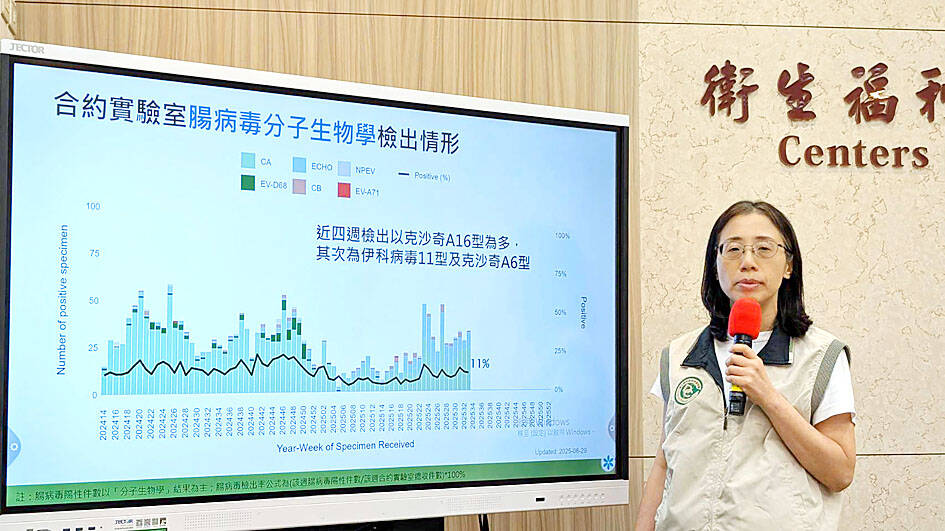Two new cases of newborns developing severe complications from enterovirus were reported last week, the Centers for Disease Control (CDC) said yesterday, adding that the 15 severe cases reported so far this year represented a six-year high.
The newborns, in central Taiwan, were less than a month old, CDC Epidemic Intelligence Center Deputy Director Lee Chia-lin (李佳琳) said.
Seven of the 15 people with severe enterovirus infections (including the two new cases) died, also marking a six-year high, she said, adding that 11 of them, mostly newborns, had contracted echovirus 11.

Photo: CNA
CDC physician Lin Yung-ching (林詠青) said the two new cases are a five-day-old baby and a 10-day-old premature baby, both of whom had a sepsis-like illness, including elevated liver enzymes, low blood platelets and coagulation abnormality.
One has been discharged from hospital after recovering, while the other remained hospitalized after three weeks of treatment, Lin said.
CDC Deputy Director-General Tseng Shu-hui (曾淑慧) said newborns can contract an enterovirus from their mother during pregnancy or childbirth, or direct contact with infected people after birth, so expectant mothers should inform a doctor if they develop symptoms.
Family members should practice good personal hygiene and avoid contact if they have symptoms, Tseng said.
Symptoms in newborns could be mild at first, such as a fever, low body temperature, reduced activity, or low appetite, but could progress into severe illness, so caregivers should pay special attention to their conditions and promptly seek medical attention when needed, she said.
Enterovirus infection has not entered an epidemic period, but cases usually rise in September when school starts, she said.
Parents and school staff should stay alert and practice preventive measures, including washing hands frequently with soap, or if they develop symptoms, rest at home and avoid going to public venues, she said.
Separately, Lee said eight new cases of local dengue were reported last week, including six that were deemed to be of the same cluster as the cases reported in Kaohsiung’s Gushan District (鼓山).
The two other cases were a family in Sanmin District (三民), who have no record of traveling to Gushan or other counties, so the source of their infection is still being determined, she said.
Nine imported cases were also reported last week — five from Vietnam and four from Indonesia, she added.
With the start of a new semester, schools should pay special attention to cleaning campuses, dumping water in containers and thoroughly washing them to avoid creating breeding grounds for mosquitoes and prevent dengue transmission, Tseng said.

The manufacture of the remaining 28 M1A2T Abrams tanks Taiwan purchased from the US has recently been completed, and they are expected to be delivered within the next one to two months, a source said yesterday. The Ministry of National Defense is arranging cargo ships to transport the tanks to Taiwan as soon as possible, said the source, who is familiar with the matter. The estimated arrival time ranges from late this month to early next month, the source said. The 28 Abrams tanks make up the third and final batch of a total of 108 tanks, valued at about NT$40.5 billion

Two Taiwanese prosecutors were questioned by Chinese security personnel at their hotel during a trip to China’s Henan Province this month, the Mainland Affairs Council (MAC) said yesterday. The officers had personal information on the prosecutors, including “when they were assigned to their posts, their work locations and job titles,” MAC Deputy Minister and spokesman Liang Wen-chieh (梁文傑) said. On top of asking about their agencies and positions, the officers also questioned the prosecutors about the Cross-Strait Joint Crime-Fighting and Judicial Mutual Assistance Agreement, a pact that serves as the framework for Taiwan-China cooperation on combating crime and providing judicial assistance, Liang

A group from the Taiwanese Designers in Australia association yesterday represented Taiwan at the Midsumma Pride March in Melbourne. The march, held in the St. Kilda suburb, is the city’s largest LGBTQIA+ parade and the flagship event of the annual Midsumma Festival. It attracted more than 45,000 spectators who supported the 400 groups and 10,000 marchers that participated this year, the association said. Taiwanese Designers said they organized a team to march for Taiwan this year, joining politicians, government agencies, professionals and community organizations in showing support for LGBTQIA+ people and diverse communities. As the first country in Asia to legalize same-sex

MOTIVES QUESTIONED The PLA considers Xi’s policies toward Taiwan to be driven by personal considerations rather than military assessment, the Epoch Times reports Chinese President Xi Jinping’s (習近平) latest purge of the Chinese People’s Liberation Army (PLA) leadership might have been prompted by the military’s opposition to plans of invading Taiwan, the Epoch Times said. The Chinese military opposes waging war against Taiwan by a large consensus, putting it at odds with Xi’s vision, the Falun Gong-affiliated daily said in a report on Thursday, citing anonymous sources with insight into the PLA’s inner workings. The opposition is not the opinion of a few generals, but a widely shared view among the PLA cadre, the Epoch Times cited them as saying. “Chinese forces know full well that